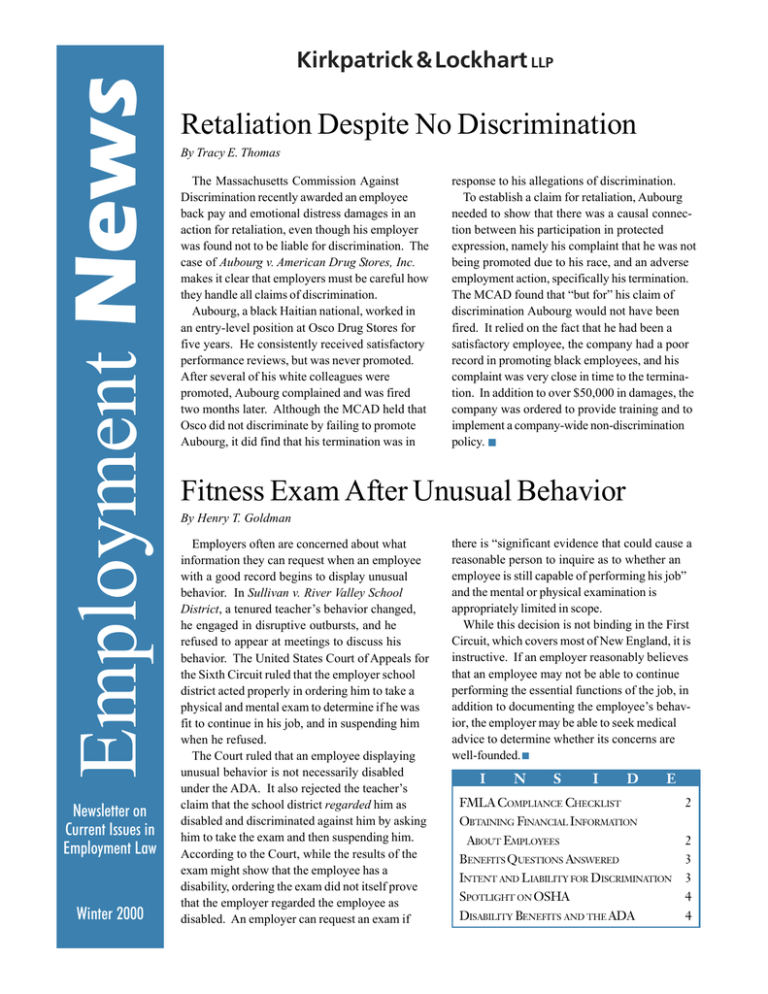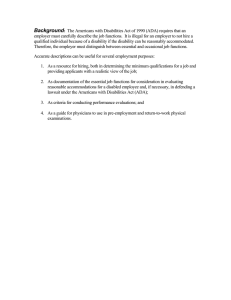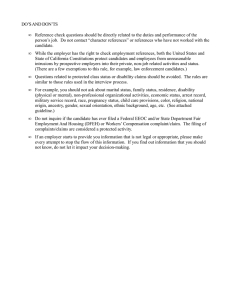Retaliation Despite No Discrimination
advertisement

Employment News Kirkpatrick & Lockhart LLP Newsletter on Current Issues in Employment Law Winter 2000 Retaliation Despite No Discrimination By Tracy E. Thomas The Massachusetts Commission Against Discrimination recently awarded an employee back pay and emotional distress damages in an action for retaliation, even though his employer was found not to be liable for discrimination. The case of Aubourg v. American Drug Stores, Inc. makes it clear that employers must be careful how they handle all claims of discrimination. Aubourg, a black Haitian national, worked in an entry-level position at Osco Drug Stores for five years. He consistently received satisfactory performance reviews, but was never promoted. After several of his white colleagues were promoted, Aubourg complained and was fired two months later. Although the MCAD held that Osco did not discriminate by failing to promote Aubourg, it did find that his termination was in response to his allegations of discrimination. To establish a claim for retaliation, Aubourg needed to show that there was a causal connection between his participation in protected expression, namely his complaint that he was not being promoted due to his race, and an adverse employment action, specifically his termination. The MCAD found that “but for” his claim of discrimination Aubourg would not have been fired. It relied on the fact that he had been a satisfactory employee, the company had a poor record in promoting black employees, and his complaint was very close in time to the termination. In addition to over $50,000 in damages, the company was ordered to provide training and to implement a company-wide non-discrimination policy. Fitness Exam After Unusual Behavior By Henry T. Goldman Employers often are concerned about what information they can request when an employee with a good record begins to display unusual behavior. In Sullivan v. River Valley School District, a tenured teacher’s behavior changed, he engaged in disruptive outbursts, and he refused to appear at meetings to discuss his behavior. The United States Court of Appeals for the Sixth Circuit ruled that the employer school district acted properly in ordering him to take a physical and mental exam to determine if he was fit to continue in his job, and in suspending him when he refused. The Court ruled that an employee displaying unusual behavior is not necessarily disabled under the ADA. It also rejected the teacher’s claim that the school district regarded him as disabled and discriminated against him by asking him to take the exam and then suspending him. According to the Court, while the results of the exam might show that the employee has a disability, ordering the exam did not itself prove that the employer regarded the employee as disabled. An employer can request an exam if there is “significant evidence that could cause a reasonable person to inquire as to whether an employee is still capable of performing his job” and the mental or physical examination is appropriately limited in scope. While this decision is not binding in the First Circuit, which covers most of New England, it is instructive. If an employer reasonably believes that an employee may not be able to continue performing the essential functions of the job, in addition to documenting the employee’s behavior, the employer may be able to seek medical advice to determine whether its concerns are well-founded. I N S I D E FMLA COMPLIANCE CHECKLIST OBTAINING FINANCIAL INFORMATION ABOUT EMPLOYEES BENEFITS QUESTIONS ANSWERED INTENT AND LIABILITY FOR DISCRIMINATION SPOTLIGHT ON OSHA DISABILITY BENEFITS AND THE ADA 2 2 3 3 4 4 Employment News Kirkpatrick & Lockhart LLP 75 State Street Boston, MA 02109 Telephone: (617) 261-3100 Fax: (617) 261-3175 240 North Third Street Harrisburg, PA 17101 Telephone: (717) 231-4500 Fax: (717) 231-4501 201 South Biscayne Blvd Miami, FL 33131 Telephone: (305) 539-3300 Fax: (305) 358-7095 1251 Avenue of the Americas New York, NY 10020 Telephone: (212) 536-3900 Fax: (212) 536-3901 Henry W. Oliver Building 535 Smithfield Street Pittsburgh, PA 15222-2312 Telephone: (412) 355-6500 Fax: (412) 355-6501 1800 Massachusetts Ave., N.W. Washington, DC 20036 Telephone: (202) 778-9000 Fax: (202) 778-9100 Judith Gail Dein Editor Kirkpatrick & Lockhart’s Labor and Employment Group is dedicated to helping employers anticipate and cope with legal issues in a manner which contributes toward a productive work environment. Consistent with this goal, this newsletter will be published quarterly to provide information on current issues in employment law. The Labor and Employment Group has experience in many aspects of employment law, including the myriad state and federal laws regulating employment relations, benefit issues, and labor relations. The Group also represents clients in litigation, including proceedings before administrative agencies and in state and federal courts. This publication is for informational purposes only and does not contain or convey legal advice. The information herein should not be used or relied upon in regard to any particular facts or circumstances without first consulting with a lawyer. © 2000 2 FMLA Compliance Checklist By James J. Arguin The Family and Medical Leave Act (FMLA) requires employers with 50 or more employees to provide 12 weeks of unpaid leave in a year for the birth or placement of a child, or for a serious health condition of the employee, his or her spouse, parent or child. While not exhaustive, the following checklist should assist employers in complying with the Act’s complex rules and regulations. 1. Adopt and uniformly implement FMLA policies that address the following: ■ Select a uniform method for determining the year (e.g., calendar or fiscal year). ■ Require employees to use accrued paid time before taking FMLA leave. ■ Require Fitness for Duty certifications before an employee returns to work. ■ Require employees to report periodically as to their plans to return to work. ■ Prohibit employees on FMLA leave from working elsewhere. 2. Provide written notice to employees designating leave time as FMLA leave. 3. Adhere to medical certification requirements. Once an employee provides a medical certification, an employer generally can request additional or clarifying medical information only under the following circumstances: ■ Employer pays for second opinion from a health care provider who is not employed on a regular basis by employer, or ■ Employer’s medical representative contacts employee’s health care provider with the employee’s prior consent to clarify authenticity of certification. 4. Maintain employee’s health plan coverage during FMLA leave period and prevent any lapses in coverage resulting from non-payment of premiums. 5. Treat all FMLA records as confidential and maintain records regarding FMLA leaves and copies of medical certifications separately from regular personnel records. 6. Review carefully all other applicable state and federal laws. Compliance with the FMLA does not ensure compliance with other applicable laws. Employee Financial Information By Stephen E. Moore Federal law severely limits the right of an employer to acquire personal financial information about an employee without first obtaining the employee’s consent, and care must be taken to comply with all applicable laws. The new banking reform law makes it unlawful for any person to attempt to obtain by any false or fraudulent means financial information from a financial institution about any customer of that financial institution. For example, to forge an employee’s signature on an authorization to disclose financial information and present the forged authorization to a financial institution is a federal crime punishable by severe penalties. The Fair Credit Reporting Act continued on page 3 . . . WINTER 2000 Employment News Our Clients Ask Us By Henry T. Goldman Q: I have two benefits questions. First, we recently sent a COBRA notice by certified mail to a terminated employee at the address in our records. The employee did not pick up the notice and it was returned to us. Do we have to send it again? Answer: Probably not. Although Internal Revenue regulations dealing with COBRA do not address this issue, most courts have held that mailing the notice once to the employee’s last known address is sufficient. However, it is important that an employer be able to prove that it sent the COBRA notice to the employee’s last known address. You should mail it certified, return receipt requested. If it is returned as undeliverable, it is a good idea -- despite the court opinions -- to try again. Re-check the address, resend the notice by first class mail and then make a note in your files that you did so. Save all receipts you receive. Second, we have a flexible spending healthcare plan and occasionally an employee leaves our employ before we have deducted enough from the employee’s salary to cover the medical bills we have paid. Can we refuse to reimburse the employee for bills in excess of what we have deducted for medical costs? Q: Answer: No. Federal law requires that you reimburse the employee for medical bills up to the limit of the employee’s authorized annual salary reduction regardless of whether you have already deducted enough from the employee’s pay. For example, if the employee authorizes a deduction of $100 per week ($5,200/year) and on January 14 presents bills for $3,000, you must reimburse the employee. If the employee leaves the company two weeks later, the company is stuck for the $2,600 in excess of what it had deducted from the employee’s pay. If you have any questions you would like addressed in this column, please let us know. Bad Intent Not Needed For Disability Discrimination By Benjamin Bejar The First Circuit Court of Appeals recently clarified that an employer acting without the intent to discriminate can be held liable for discrimination on the basis of disability under the ADA. The failure to make a reasonable accommodation alone may be sufficient to impose liability. In Higgins v. New Balance Athletic Shoe, Inc., Higgins alleged that his employer had failed to reasonably accommodate his hearing disability by refusing to make certain adjustments to his immediate work area which interfered with the operation of his hearing aid, including moving a loud speaker and installing a fan to dissipate humidity. According to the Court, the ADA, unlike other federal anti-discrimination statutes, does not require that an employer’s actions be motivated by a discriminatory animus directed at the disability. Rather, any failure to provide a reasonable accommodation for a disability within the meaning of the ADA constitutes discrimination unless the employer can affirmatively show that providing Obtaining Employee Financial Information prohibits any attempt by an employer to obtain a credit report about an employee or job applicant from a credit bureau without giving the employee or applicant prior notice of such request and obtaining his or her written WINTER 2000 continued from page 2 . . . consent. Again, there are significant penalties for violating this law. We have a memorandum about obtaining financial information on employees and would be glad to send it to you on request. an accommodation would impose an undue hardship on the business. Therefore, regardless of an employer’s intent, a failure to provide a reasonable accommodation to a known disability may constitute discrimination under the ADA. Quick Quiz/Yes or No 1. Y or N - Under the Massachusetts Small Necessities Leave Act, may an employee take repeated leaves? 2. Y or N - Do the requirements of the Fair Credit Reporting Act relating to obtaining credit reports apply to information about employees? 3. Y or N - Can a Massachusetts employer require employees to take a polygraph test? 3 Employment News Spotlight On OSHA: Telecommuting And Ergonomics By Mark M. Whitney The Occupational Safety and Health Administration (OSHA) has addressed two important issues telecommuting and ergonomics. Regulations that may have significant impact on the workplace are under consideration. OSHA recently issued an advisory which stated that employers are responsible for identifying hazards associated with work assignments conducted from home, such as unsafe stairs and improper lighting, and for providing protection against such hazards through employee training, personal protection equipment and other controls. The advisory sparked a heated debate over the extension of OSHA into the home, and its possible effects on telecommuting. The advisory was retracted because it had caused widespread confusion, but the issue has not disappeared. A panel is being formed to consider the social and economic effects of telecommuting, and OSHA plans to develop safety guidelines for the home workplace. In November 1999, OSHA released proposed regulations governing workplace ergonomics standards. These comprehensive standards were designed to regulate the incidence of musculoskeletal disorders (i.e. carpal tunnel syndrome, back injuries) in the workplace. The regulations would require, among other things, a complete ergonomics plan for manufacturing and manual handling industries, and would require all companies with any report of musculoskeletal injury to conduct a job hazard analysis and employee training. The regulations also propose extended time off with pay for injured employees. The regulations are very controversial, and many suggestions are expected during the comment period, which is presently scheduled to close on February 1, 2000. OSHA expects that some regulations will be in place by the end of this year. Total Disability And Coverage Under The ADA By Sarah C. Kellogg The United States Supreme Court recently ruled that an employee’s statement in a social security benefits application that he was totally disabled does not necessarily prevent the employee from making a claim of disability discrimination under the ADA. (See Employment News, Summer 1999 Edition). This is because being disabled for social security purposes is not always inconsistent with being able to perform the functions of a job with reasonable accommodation (a prerequisite for an ADA claim). The Supreme Court ruled that an employee’s ADA claim could go forward as long as the employee offered “a sufficient explanation” for the apparent inconsistency between the two claims. A Massachusetts trial court judge recently addressed what would 4 constitute “a sufficient explanation.” In Pyrcz v. Bradford College, an employee was granted a number of leaves following a nervous breakdown. The college refused to let him return to work even though he said he could work without restrictions. After the employee was terminated, he received total disability benefits and sued the college under the ADA. The college’s defense was that the employee had taken inconsistent positions by claiming that he could return to work without restrictions but also claiming that he was totally disabled for social security purposes. The trial judge upheld the position of the college, and found that once he claimed he was totally disabled, the employee must at least prove that he had told his employer that he could perform the essential functions of his job with a reasonable accommodation. Pyrcz had failed to offer any explanation of his inconsistent positions, much less a “sufficient” one. Answers to Quick Quiz 1. Yes - the employee may take up to a total of 24 hours of leave, and the leave may be taken intermittently over the course of a twelve-month period. (M.G.L. c. 149, § 52D(b) and (c)). 2. Yes - employers must comply with the Fair Credit Reporting Act when requesting information about both employees and job applicants. 3. No - under Massachusetts law it is unlawful to request or administer a lie detector test as a condition of employment or continued employment. (M.G.L. c. 149, § 19B)). WINTER 2000 Kirkpatrick & Lockhart LLP



